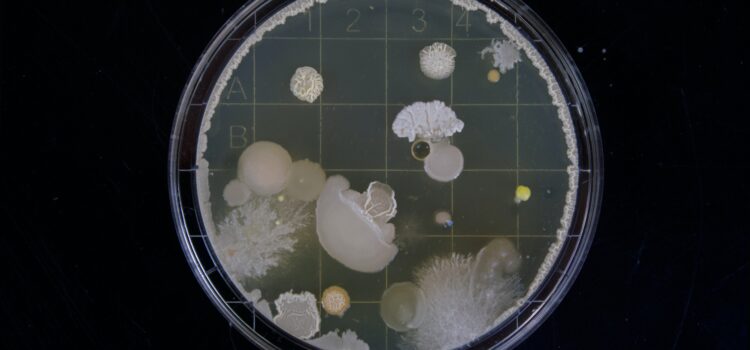

This article gives you a glimpse of what you can learn with Shortform. Shortform has the world’s best guides to 1000+ nonfiction books, plus other resources to help you accelerate your learning.
Want to learn faster and get smarter? Sign up for a free trial here .
Are all types of bacteria bad? What are the benefits of bacteria?
When bacteria come to mind, you might think about the kind that make you sick. But actually, some types of bacteria protect you from diseases, make you happier, and more. Most of these bacteria are found in your gut, and they impact the health of the rest of your body.
Keep reading to learn more about these benefits of bacteria found in the gut that you may not know about.
How Gut Bacteria Work
You have trillions of bacteria on your skin and in your body. According to Steven R. Gundry’s book The Plant Paradox, bacteria live and feed on you, but your well-being is also dependent on them. Most bacteria live in your gastrointestinal (GI) tract—your gut. These make up your microbiome, the collection of all microbes on and in our bodies, and they have several critical jobs:
- Break down and digest food, extracting the energy and distributing it to you in the form of fats
- Act as a first response team for your immune system, detecting harmless or harmful proteins and bacteria
- Absorb nutrients from food and the environment
- Protect you from outside objects passing through your intestines
- Communicate with your brain and control certain body functions
To understand why bacteria’s functions are so important, we’ll look at the benefits of bacteria in the gut and how they serve the rest of the body.
Benefit #1: Healthier Food Cravings
You and your bacteria have a symbiotic relationship: You rely on them (whether or not you know it), and they rely on you. As such, it’s in your bacteria’s best interest to keep you in good health; they’re in constant communication with your brain and body to control your hormones, appetite, cravings, and other functions.
But the balance of good and bad bacteria can be disrupted. If you kill your good bacteria (such as Lactobacillus and Bifidobacteria) with certain foods and products—or starve them by not eating certain foods—bad bacteria can take over and harm your health. Bad bacteria have no interest in keeping you healthy. They want only what benefits them; bad bacteria hijack the communication between your gut and your brain and drive you to crave sugars, fats, and unhealthy foods that nourish them but harm your health.
Benefit #2: Better Digestion and Nutrition
In Gut, Giulia Enders explains that bacteria help in the digestive process by extracting nutrients from your food.
Your bacteria make your gut more efficient by breaking down foods that your body can’t process alone. Enders explains that sometimes your gut lacks the enzymes to digest particularly complex substances, such as lactose or plant starches. Your gut bacteria can produce these enzymes to help you break down and absorb the food. In this way, according to Enders, your microbes provide you with about 10% of your nutrition.
Benefit #3: Stronger Immune System
Gut explains that the good bacteria in your gut train your immune system, helping you fight off infections, viruses, and bad bacteria. She explains that your gut holds microbes in the mucus membrane, an area that prevents them from being absorbed through the gut wall. This ensures that bad bacteria won’t impact other parts of the body and cause sickness.
Enders describes the mucus membrane as a testing ground for the immune system. When your immune cells in the mucus membrane come in contact with the microbes held there, they learn to distinguish the good bacteria from the bad. In the future, this training will help your immune cells kill the bad bacteria while leaving the helpful ones alone in other parts of the body.
For example, one part of the body that is protected by good bacteria is the eyes. Your Inner Fish by Neil Shubin says that, when there are too many or too few of certain microbes in our eyes, we’re more prone to eye diseases. Your eye health depends on the health of your gut—certain eye diseases can be triggered by bad gut microbes causing inflammatory pathways. Your gut depends on good bacteria, and so do your eyes.
Benefit #4: Intact Gut Lining and Good Cellular Health
Imbalanced gut bacteria causes mitochondrial inefficiency, which degrades cellular health and makes you more susceptible to diabetes, Alzheimer’s, and heart disease. In Super Human, Dave Asprey explains that gut bacteria help maintain the integrity of your gut lining—the barrier between your digestive tract and bloodstream. Your gut lining plays a massive part in the health of your immune system because it absorbs necessary nutrients from your bloodstream and prevents toxins from your digestive tract from leaking into your bloodstream.
However, when your gut bacteria are out of balance, your gut lining breaks down, fails to absorb nutrients, and leaks toxins into your bloodstream. Imbalanced gut bacteria could then cause inefficient mitochondria that are unable to produce enough antioxidants to defend your cells against free radicals (molecules that initiate a chemical reaction [oxidation] that damages the structure of your cells)—resulting in cellular damage.
According to Asprey, various factors cause gut bacteria to become imbalanced, including eating products derived from animals that have been fed antibiotics or from crops sprayed with insecticides, using antibiotics or antibacterial soaps, and consuming an insufficient amount of fiber.
Benefit #5: Improved Mental Health
Gut explains that one of the biggest benefits of bacteria lies in the connection between the gut and the brain. Some scientists believe that the composition of our gut bacteria can impact our susceptibility to stress, anxiety, and even depression.
While she acknowledges that more research needs to be done on the brain-gut connection, Enders cites several studies that offer support for this theory. Let’s explore these studies and their conclusions in detail.
Laboratory Studies on Animals
According to Enders, studies conducted on mice and rats have shown a strong connection between the gut and the brain. One study, conducted in 2011, found that mice with healthier guts showed fewer depressive tendencies, performed better on memory tests, and produced fewer stress hormones.
Another study found that gut health affected mice’s personalities. Researchers used two species of mice: one that was more gregarious and curious and one that was more shy. They switched the species’ gut bacteria and found these personality traits reversed. A further study, conducted in 2016, took bacteria from humans with depression and put them into rats. They found that the rats exhibited symptoms of depression.
These studies demonstrate a connection between the gut and the brain in mice and rats. However, Enders is careful to note that we can’t automatically translate these results to humans.
Studies on Humans
While most of our knowledge of the gut-brain connection comes from research on animals, Enders does cite several studies with human participants. One study found that the presence of the bacteria Bifidobacterium bifidum slightly reduced anxiety before a test, but only in subjects who did not sleep well. Another study found that participants who took probiotics—a supplement of helpful bacteria—for three to four weeks saw a slight increase in mood. However, a third study, conducted in 2017, found that sustained probiotics did not affect depressive symptoms. Overall, Enders maintains that these individual studies are inconclusive and that more research is required.
Updates on the Gut-Brain Connection
Since Enders published the updated edition of Gut in 2018, further research has confirmed and extended her claims. Here’s a brief update on scientists’ understanding of the gut-brain connection.
For studies conducted on animals, the sources that Enders cites suggest a connection between gut health and depression, memory, stress, and personality. Further animal studies have largely confirmed these findings. For example, a 2020 study found that a probiotic regimen in rats reduced depressive symptoms and elevated the activity of neurotransmitters in the brain. Other recent studies have found that a healthy gut can help reduce anxiety and chronic stress in mice.
Meanwhile, studies with human participants have continued to show a connection between the gut and mental health, although the extent of that connection is still unclear. There’s more evidence that probiotics can help in the treatment of depression: A 2019 study found that the probiotic Lactobacillus plantarum 299v improved cognitive functions such as reasoning, memory, and learning in patients with depression. The authors recommended probiotic use as a supplement to depression therapy.
Furthermore, in a 2020 study, researchers at the University of Oxford found a correlation between the composition of gut bacteria and personality traits in humans. According to the study, participants with high populations of the bacteria Lactococcus, Akkermansia, and Oscillospira tended to be more extroverted and communicative. On the other hand, less sociable people tended to have higher populations of the bacteria Desulfovibrio and Sutterella. The researchers’ results are the first to show a connection between personality and gut bacteria composition in humans.
Final Words
There are large populations of bacteria all around you. Most of the bacteria living in your gut is there to protect you, as shown by the benefits of bacteria we’ve listed. Now that you know more about what bacteria are doing inside you, you have a better understanding of your body.
Were you surprised by these benefits of bacteria? Let us know your thoughts in the comments below!

Want to fast-track your learning? With Shortform, you’ll gain insights you won't find anywhere else .
Here's what you’ll get when you sign up for Shortform :
- Complicated ideas explained in simple and concise ways
- Smart analysis that connects what you’re reading to other key concepts
- Writing with zero fluff because we know how important your time is






